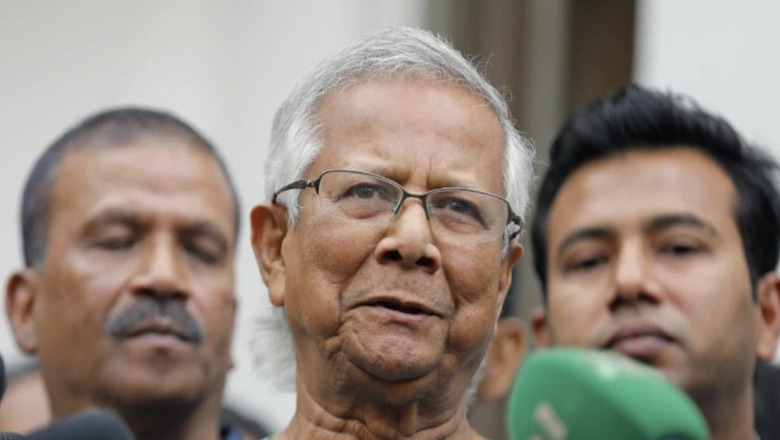
views
The provocative remarks made by Muhammad Yunus, chief advisor to the interim government in Bangladesh, claiming that India has exaggerated the attacks on Hindus, communalised political events, and needs to change its narrative, warrant a reality and fact check—one that should prompt serious reflection on Yunus’s part regarding the veracity of his statements and the sincerity of his recent actions.
In attempting to downplay the atrocities against Hindus, Yunus asserted: “These attacks are political in nature, not communal. India is amplifying these incidents significantly. We have not said we can’t do anything; we have said we are doing everything.”
He further pontificated: “The way forward is for India to move away from this narrative. The narrative is that everybody is Islamist, the BNP is Islamist, and that everyone else is Islamist and wants to turn this country into Afghanistan. India believes Bangladesh is safe only with Sheikh Hasina at the helm. India is captivated by this narrative. India needs to move on from it. Bangladesh, like any other nation, is simply a neighbour.”
The situation on the ground in Bangladesh, however, tells a different story. Since the resignation of Prime Minister Sheikh Hasina, according to the Bangladesh Hindu Buddhist Christian Unity Council, there have been at least 205 attacks against Hindus reported from 52 districts. Temples have been attacked, Hindu businesses damaged, and homes burnt. At least five Hindus have been killed.
The claim that these Hindus were collateral casualties caught in the political crossfire between the opposition and the Awami League is neither acceptable nor accurate. The targeted looting of Hindu shops, attacks on temples, and the killings of even apolitical Hindus are clear indicators of the religious bigotry present in Bangladesh.
Anupam Debashish Roy, Bangladeshi author and activist, aptly summarised: “Communal sentiments have always been present in Bangladesh. There are people who look for an opportunity to attack minorities, especially Hindus. Even during the Awami League regime, there were attacks on Hindus. Communalism is a hard fact of Bangladeshi society.”
Attacks against the Hindu minority occur at regular intervals in Bangladesh; any adverse event, political or otherwise, becomes an excuse to target Hindus. These atrocities culminated during the Bangladesh Liberation War, arguably the darkest period for Bangladeshi Hindus, who became victims of a horrendous genocide.
In Gary Bass’ book, The Blood Telegram: Nixon, Kissinger, and a Forgotten Genocide (Vintage, 2014), Archer Blood, the American Consul General in Dhaka, highlights the “international moral obligations to condemn the genocide… of Pakistani Hindus.” David Bergman, an investigative journalist based in Bangladesh at the time, also references the Hindu genocide in an op-ed (The Politics of Bangladesh’s Genocide Debate, April 5, 2016, New York Times), stating: “There is no question that there were many atrocities, including rape, deportation, and massacres of civilians, carried out by the Pakistani Army, aided at times by pro-Pakistani militias. Some of these militias included members of the student wing of Jamaat-e-Islami, an Islamist party that remains a powerful force in Bangladesh today. There is an academic consensus that this campaign of violence, particularly against the Hindu population, was genocide.”
Estimates of the actual number of deaths vary widely, from a low of 26,000, put forward by the Pakistan government (Hamood-ur-Rahman Commission), to a high of 3 million reported in international media. The official position from Bangladesh concurs with the 3 million figure. R.J. Rummel, in his book Statistics of Democide: Genocide and Mass Murder Since 1900 (Ch 8), concludes: “Consolidating both ranges, I give a final estimate of Pakistan’s democide to be between 300,000 and 3,000,000, or a prudent 1,500,000.”
Using these estimates, the final casualty figures for Hindus range from 1.2 to 2.4 million, as Hindus accounted for nearly 80 per cent of those killed—a staggering figure by any standard.
In 2001, following the electoral victory of the BNP led by Khaleda Zia, her supporters unleashed a systematic campaign of violence against Hindus that lasted for approximately 150 days. A judicial commission investigating this violence documented around 18,000 incidents of major crime; about 1,000 Hindu women were raped, and 200 were victims of gang rape. Nearly 500,000 Hindus fled to India.
When the International Crimes Tribunal indicted several Jamaat members in 2013 for war crimes against Hindus during the 1971 Bangladesh atrocities, their supporters retaliated by attacking Hindus. Hindu properties and businesses were looted, women were abducted and raped, and temples were desecrated. Overall, more than 50 Hindu temples were destroyed, and over 1,500 Hindu homes were burned across 20 districts.
This increasingly hostile environment in Bangladesh (described as ‘Jihadistan’ by exiled Bangladeshi writer Taslima Nasreen) has led to an unrelenting exodus of Hindus from the country. The Hindu population, which constituted 28 per cent of the region in 1940, sharply declined, particularly during two dark periods: the Partition and the 1971 Bangladesh War. Even after the emergence of Bangladesh, the Hindu population has shrunk from 13.5 per cent in 1974 to around 7 per cent today.
Professor Abul Barakat of Dhaka University, in his book The Political Economy of Reforming Agriculture: Land and Water Bodies in Bangladesh, warns: “There will be no Hindus left in Bangladesh in 30 years.” A prediction that may well come true if Bangladesh does not change.
Muhammad Yunus must take heed of these stark facts before making rash statements. At this critical juncture, Yunus needs to match his actions with his words. There appears to be a glaring disconnect between what he says and what he does. Upon assuming office, he made a much-publicised visit to the Dhakeshwari Hindu Temple in Dhaka and called Prime Minister Narendra Modi to assure him of the safety of Hindus.
Concomitantly, his actions have raised questions about his commitment to secularism and have not instilled confidence among minorities in Bangladesh. Furthermore, these actions have not eased India’s concerns.
First, his interim government lifted the ban on Jamaat-e-Islami, the country’s largest Islamist party, which supported Pakistan during Bangladesh’s War of Liberation in 1971.
Then, on 31 August, he was photographed meeting with Mamunul Haque, a leader of the extremist group Hefazat-e-Islam. Formed in 2010, Hefazat-e-Islam is a radical Islamic organisation opposed to constitutional principles and known for its anti-India stance. This group was at the forefront of protests during Prime Minister Modi’s visit to Bangladesh.
His government also released Jashimuddin Rahmani, the leader of the Ansarullah Bangla Team (ABT), an al-Qaida-affiliated terrorist outfit aiming to establish a jihadi network across the subcontinent.
Kajal Debnath, Vice-President of the Bangladesh Hindu Buddhist Christian Unity Council, told the Associated Press after the recent violence against Hindus: “Hindus are shivering. They are not opening their doors without confirming who is knocking. Hindu minorities, from the capital Dhaka to the remote villages, are very scared.”
The fear among Hindus is palpable. By calling it “exaggerated,” Yunus is trivialising their suffering and displaying crass insensitivity. Instead of engaging with terrorist and extremist elements, Muhammad Yunus should focus on ensuring the safety of the “shivering Hindus” if he wants India to reconsider its narrative about post-Sheikh Hasina Bangladesh.
The writer is a US-based author. Views expressed in the above piece are personal and solely that of the author. They do not necessarily reflect News18’s views.



















Comments
0 comment